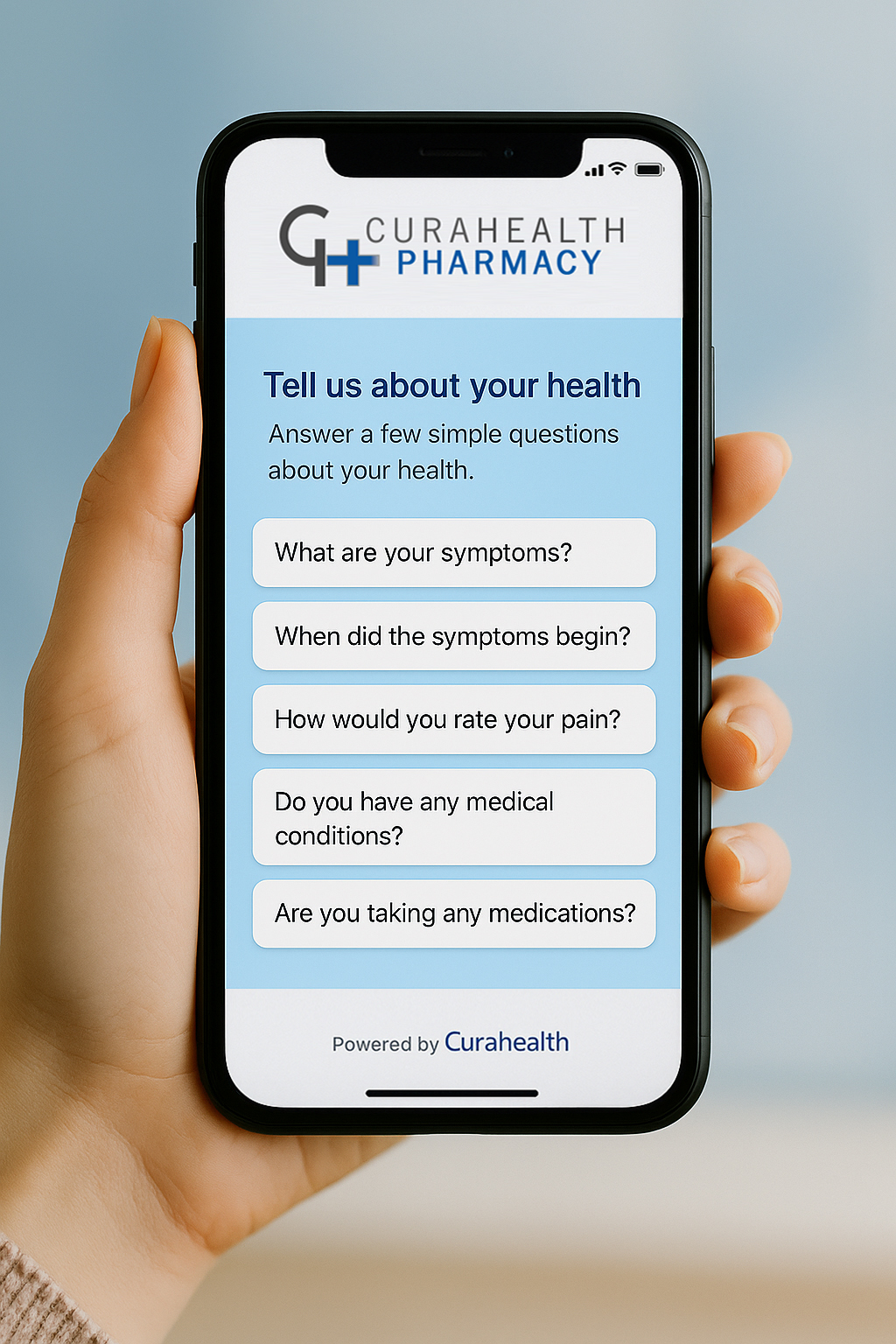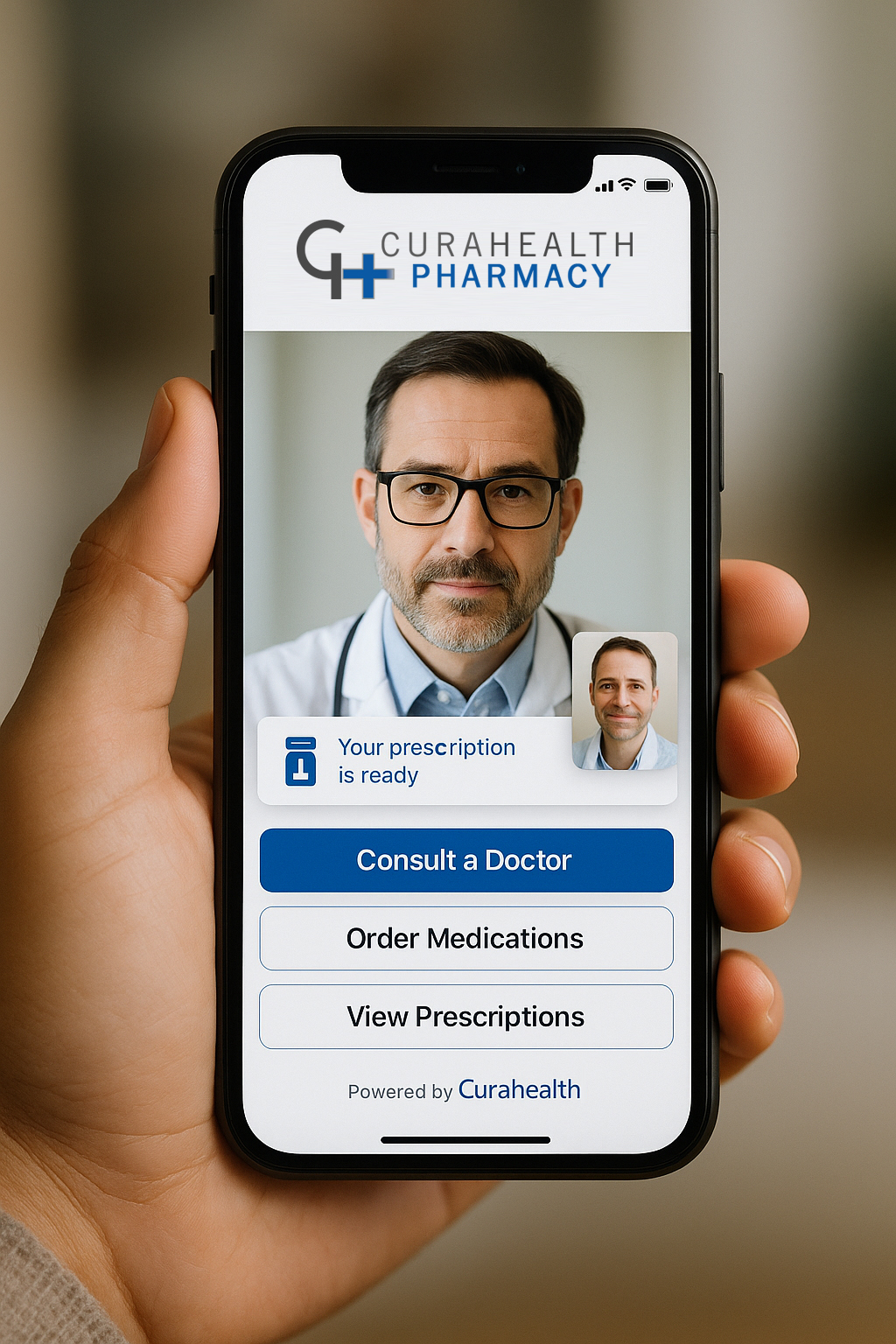Curahealth pharmacy platform
- Experienced U.S. licensed healthcare providers
- No subscriptions or hidden fees
- Low-Cost antidepressants, prescribed online
- FDA-approved prescription antidepressants
- Fast delivery in a discreet package








Antidepressants help manage symptoms of depression and anxiety by balancing brain chemicals like serotonin. They’re prescribed after a mental health assessment and may take weeks to show effects. It’s important to take them as directed and not stop suddenly without a doctor’s advice, as withdrawal or relapse can occur.
Get a prescription antidepressant medications online with guidance from U.S. licensed doctors. Quick, discreet shipping and convenient refills make mental health care easier.



Tell Us About Your Health
No need for an office visit. Just take two minutes to describe your symptoms and medical history online — anytime, from anywhere.
Reviewed by a Doctor
Our licensed provider will assess your info and recommend the right treatment. You can connect with them by message, phone, or video.
Get Your Medication
If a prescription is approved, your medication will be shipped quickly to your door in discreet packaging to protect your privacy.
Antidepressants are indispensable remedies for multifarious ailments and conditions, still, they should be employed carefully. Let’s look at data about this category of pills.
Antidepressants have emerged as a paramount instrument in the sphere of mental healthiness, proposing assistance to numerous individuals combating miscellaneous ailments and disorders, particularly depression.
This category of remedies, intended to regulate neurotransmitters in the brain, has undergone noteworthy alterations since its creation.
As society becomes more oriented toward mental well-being, comprehending the mechanisms, types, and possible adverse effects of antidepressants becomes critical.
This article delves into the complicated world of antidepressants, investigating their multifarious classifications and the nuanced influence they have on people’s lives.
Disclosing the scientific data behind these pills is paramount for stimulating knowledgeable discussions on the management of mental healthiness.
Antidepressants are remedies created to facilitate indications of depression by regulating neurotransmitters in the brain.
These pills are occasionally employed to deal with conditions like chronic aches and sleeping disorders. Although antidepressants cannot be called cures, they assist in coping with indications and repairing balance in individuals encountering depressive disorders.
Nowadays, antidepressants are among the most investigated remedies. It is paramount to consult with a doctor to define the most fitting antidepressant and dosage since replies to these remedies can vary.
First of all, antidepressants impact neurotransmitters in the brain, in particular, serotonin, norepinephrine, and dopamine.
By modulating the levels of these chemicals, the remedies assist in regulating mood and facilitating indications of depression.
Selective serotonin reuptake inhibitors, serotonin-norepinephrine reuptake inhibitors, and tricyclic antidepressants represent widespread classes of antidepressants, each with a separate principle of operation.
These remedies are directed to reinforce neurotransmission and repair chemical balance, supplying relief for individuals suffering from depressive disorders.
Antidepressants are famous remedies designed to facilitate indications of depression by modulating the levels of neurotransmitters in the brain. Today, physicians separate antidepressants into a few types, each with its unique indications, consequences, principle of operation, etc.
SSRIs operate by blockading the reuptake of serotonin, a neurotransmitter connected with mood regulation, in the brain. This drives to boost in serotonin levels in the synapses, enhancing mood. Well-known examples of SSRIs are escitalopram (Lexapro), citalopram (Celexa), fluoxetine (Prozac), sertraline (Zoloft), and paroxetine (Paxil).
As the name implies, SNRIs inhibit the reuptake of both serotonin and norepinephrine. By growing the accessibility of these neurotransmitters, SNRIs strive to enhance mood. Venlafaxine (Effexor) and duloxetine (Cymbalta) are well-known representatives of SNRIs.
TCAs, in turn, blockade the reuptake of serotonin and norepinephrine, as SNRIs do. Nonetheless, they frequently have more unpleasant side effects. Amitriptyline, nortriptyline, and imipramine are referred toas TCAs.
MAOIs avert the disintegration of neurotransmitters, particularly, serotonin, norepinephrine, and dopamine by inhibiting the action of monoamine oxidase.
Due to possible interplays with definite products and remedies, MAOIs are typically employed for cases when other antidepressants are ineffective. Among the most widespread examples of MAOIs are phenelzine and tranylcypromine.
This category comprises remedies with multifarious principles of operation that don’t fit adeptly into the other classes. They may influence miscellaneous neurotransmitters, particularly, serotonin, dopamine, and norepinephrine.
Bupropion (Wellbutrin), mirtazapine (Remeron), and trazodone refer to atypical antidepressants.
NDRIs boost the levels of norepinephrine and dopamine by blockading their reuptake. This may potentially have a positive influence on mood and energy levels. Bupropion (Wellbutrin) is a good example of NDRIs.
NaSSAs raise the levels of norepinephrine and serotonin by blockading their reuptake and antagonizing definite receptors. Mirtazapine (Remeron) represents a clear example of NaSSAs.
Today, a few antidepressants are commonly prescribed and regarded as popular for struggling with depression and related disorders.
It is meaningful to stress that the popularity of concrete antidepressants can alter over time, and new remedies may emerge.
Always consult a physician for up-to-date data. Let’s consider the best antidepressants to deal with multifarious psychological disorders.
Prozac is one of the most prominent and broadly prescribed SSRIs. It operates by boosting the levels of serotonin in the brain, which is regarded to have a positive influence on mood.
Effexor is an SNRI that operates by boosting the levels of serotonin and norepinephrine in the brain. It is often employed for major depressive disorder and generalized anxiety disorder.
In contrast to SSRIs and SNRIs, Wellbutrin predominantly impacts the levels of dopamine and norepinephrine. As a rule, it is utilized by individuals who encounter sexual negative consequences with other antidepressants or those who desire to stop smoking.
TCAs, in particular, amitriptyline and nortriptyline, are among the first-generation antidepressants. Although these pills have been replaced to a large extent by newer remedies because of their side effect profile, they are still employed in definite cases.
Although antidepressants can be beneficial in struggling with depression and mood disorders, it is paramount to recognize possible adverse effects connected with their utilization. Let’s have a glance at some of the most widespread adverse effects of antidepressants.
It is of utmost significance to mention that the usefulness of antidepressants frequently outweighs the side effects for numerous individuals.
In addition, the decision to employ these remedies should be made in consultation with a physician.
Aside from mild side effects, utilization of antidepressants may drive to more serious outcomes. Furthermore, intake of these remedies is associated with definite risks.
It is paramount for individuals employing antidepressants to speak plainly with their physician about any side effects or troubles. A proficient doctor can assist in monitoring the effectiveness of the remedy and correcting the treatment plan if required.
Furthermore, frequent check-ups and follow-ups are of utmost significance to guarantee the general well-being of the individual passing antidepressant therapy.
To sum up, antidepressants have undoubtedly altered the treatment of mental healthiness, proposing relief to many patients struggling with the burden of depression.
Although the effectiveness of antidepressants is transparent, it is paramount to approach these remedies with a subtle comprehension.
The miscellaneous nature of mental healthiness demands personalized strategies, recognizing that antidepressants may not be a universal solution.
Furthermore, constant research is imperative to disclose possible long-term effects and refine treatment methods.
As we navigate the intricate landscape of mental healthiness, a holistic approach comprising therapy, lifestyle modifications, and remedies adapted to individual necessities occurs as a promising paradigm for ensuring sustainable well-being.
Can I acquire antidepressants over the counter?
Antidepressant remedies are accessible by prescription only. Nonetheless, there are many over-the-counter antidepressant herbs and supplements obtainable for patients.
Are antidepressants indeed effective?
Yes, antidepressants can be useful and effective for numerous individuals in treating signs of depression.
How long does treatment with the aid of antidepressants last?
The length of treatment with antidepressants can vary broadly depending on a few factors, comprising the individual’s concrete condition, the harshness of signs, and how well they reply to the remedy.
Nonetheless, physicians will typically propose a patient to employ antidepressants for a minimum of 6 months.
What is the advised dose of antidepressants?
The advised dose of antidepressants can vary depending on the concrete remedy, the individual’s healthiness, the severity of their signs, and many multifarious factors.
As a rule, your physician may suggest you employ 1 to 3 pills a day.